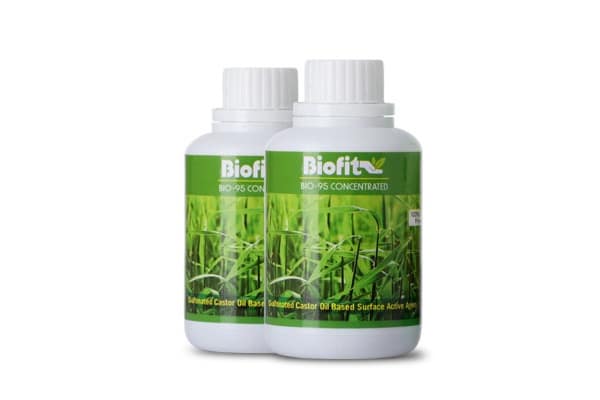Supreme Bio Fungicide Manufacturers and Suppliers in India - Jaivik Crop Care LLP
Jaivik Crop Care LLP is a trusted name in sustainable agriculture, offering scientifically formulated Bio Fungicide designed to protect crops from fungal diseases naturally. The bio fungicides are prepared by our educated experts utilizing the best-grade chemical mixes and advanced innovation as per the worldwide quality guidelines that suppress harmful fungi, promote soil health, and ensure long-term crop productivity. Furthermore, the offered bio fungicides are stringently tested on different parameters before being it to the customer.
Bio Fungicides are Organic and Biological organisms that are used to destroy or prevent fungi or fungal spores. Fungi may be very destructive in farming, and yield, quality, and profit losses may be taken very seriously. We are offering the unmatched and competent bio fungicide manufacturer in powder, fluid, and granular forms. The products are perfect for farmers who want to protect their plants with organic, residue-free, and sustainable ways.

Bio-Fungicide Exporter
These bio-fungicides are utilized to control contagious diseases and make plants resistant to contagious diseases and bacterial assaults. It ensures the development of seeds, roots, and rising shoots from soil-borne pathogens. It colonizes roots, expands root mass and well-being, and thus gives yield increments.
Our bio fungicides are compelling in controlling parasitic infections like Phytophthora, Pythium, Rhizoctonia, Fusarium, and root rot, Blast, Root Rot, Wilt, Tikka, Root-Rot, Rhizome Rot, Wilt, Leaf Spots, Sheath Blight, Sheath Rot, Powdery Mildew, Downy Mildews, Red Rot, Damping Off and other Fungal Diseases and so on. Our bio fungicide suppliers are successful in products like Cotton, Tea, Sugar Cane, Paddy, Pulses Coriander, Groundnut, Grapes, Strawberry, Banana, Mango, Chickoo, Lemon, Arhar and different Pulses, Mustard, Onion, Tomatoes, Banana, Potato, Chilies, Capsicum, Brinjal, Ginger, Garlic, Lady’s Finger, Roses and so forth. The main States of supplying and exporting are MP, Chhattisgarh, Gujarat, Karnataka, Andhra Pradesh, Himachal Pradesh, Bihar, and Maharashtra. We also top leading in exporting bio fungicide in South Africa, Thailand, and other Asian Countries.
Specification of Bio-Based Fungicide
| Content | Oil of Wild plant seeds and emulsifier |
| Function | To control disease of fungus, bacterial and virus as Downy mildew, Ring Spot, Anthracnose, Soft Rot and leaf spot |
| Dose | 1.0 to 1.25 ml per Liter of water |
| Recommended Crops | Any Field Crops and/ or Horticultural Crops |
| Used as on | At the time of disease or before colonization |
| Compatibility | Mix with most of all pesticides/ fungicides/ PGR |
| Pack In | HDPE bottles |
| Packing Available | 250 ml / 500 ml / 1 k |
Key Features
- Premier microbial formulation of targeted performance.
- No toxic and non-residue biodegradable.
- Greater shelf life and convenience.
- Applicable both as a prevention and as a treatment.
- Reduce the use of chemical Fungicides
- In most cases are safer to use and have a lower re-entry interval.
- Many products can be used by organic growers.
- In most cases, they are less phytotoxic.
- Many products can be used in rotation with chemicals (fungicides, insecticides, fertilizers, rooting components)
Application of Organic Biofungicides
- One can apply it to cereals, pulses, vegetables, fruits, oilseeds, cash crops, and plantation crops.
- Foliar Spray: 5-10g per liter of water to prevent and cure diseases.
- Soil Usage: 2 -4 kg/ acre using compost or farmyard manure.
- Active against powdery mildew, leaf spot, wilt, damping-off, and root rot.
- Applicable in 5-10g/kg of seed before planting, in the soil, foliar spray, and drip irrigation.
- The constant use is guaranteed to keep the disease under control and is of better crop vigor.
How Do Bio Fungicides Protect Crops Naturally?
The bio fungicides are non-toxic substances safe to humans, animals, and pollinators. They cause no toxic residues, unlike synthetic fungicides, which ensure organic and export-grade crops.
The synthetic fungicides are frequently developed against resistant pathogens. Multiple modes of action of organic bio fungicides have been applied, including competition, antibiosis, and immunity stimulation of diseases, enabling them to be applied in long-term management of diseases.
Formulation: Many bio fungicide formulations are composed of beneficial microbes such as Trichoderma and Bacillus subtilis, which:
- Foster nutrient absorption.
- Increase root growth.
- Regain the balance of microbes in the soil.
The bio fungicides are accepted in organic farming and play a very important role in avoiding chemical pesticides. They enable farmers to engage in regenerative and sustainable farming practices.
Importing countries set tight pesticide limits on agricultural products. Application of bio fungicides that leave no residue behind enables farmers to export their produce and achieve success at the global level.
Bio fungicides have a higher long-term yield as they eliminate losses through crop infestation, increase soil health, and limit recurring costs in the form of chemical sprays.
Bio fungicides have a use on:
- Fruits and vegetables
- Cereals and Pulses
- Ornamentals and Florists
- Plantation Crops
- The cultivation in a Greenhouse and Polyhouse
Mode of Action
Jaivik Bio Fungicides offer microbial strains like Trichoderma harzianum, Pseudomonas fluorescens, and Bacillus subtilis. These act through:
- Competition: Outcompete the growth of the bad fungi, both for space and nutrients.
- Antibiosis: Secret natural antifungal chemicals.
- Mycoparasitism: Destroy, attack, and destroy fungal pathogens.
- Induced Resistance: Enliven regards to the natural defense of the plant.
Crops Suitable For
- Field Crops: Paddy, Wheat, Maize, Cotton, Pulses.
- Horticultural Crops: Etruks, Plants, and Ornaments.
- Plantation Crops: Tea, Coffee, Sugarcane, and Banana.
- Greenhouse & Farming Floriculture.
Packaging Options
Packaged in 250g, 500g, 1kg, and 5kg.
In-store bulk packaging for large-scale distributors and exporters.
Storage & Shelf Life
Keep in a cool, dry, air-free place away from sunlight.
Shelf life 12-24 months when stored properly.
Why Jaivik Bio Fungicides?
Eco-Friendly & Organic: Developed with dependencies of naturally occurring beneficial microbes.
Safe for Soil and Environment: No chemical residues; benefits the biodiversity of soil.
Efficient Fungicide: Shield crops against such pathogens as Fusarium, Pythium, Alternaria, and Rhizoctonia.
Resistance Prevention: Eliminates the hazard of pathogen resistance due to the recurrent application of the chemical.
Organic Farming: Ideal in Integrated Pest Management (IPM) programs.
Farmers should prefer biofungicides to chemical fungicides for what reasons?
Plant diseases present a major challenge to agriculture because they cause critical worldwide losses in yield production. Plant diseases annually cause 20% to 30% of worldwide crop destruction as reported by the Food and Agriculture Organization (FAO), yet these numbers endanger global food safety and reduce farmers’ incomes.
The primary weapon against fungal pathogens used to be chemical fungicides. Their widespread application creates short-term protective effects but the excessive use has generated several developing problems, including:
- The development of fungicide-resistant pathogens
- Toxic residues on crops and in soil
- Hazards exist that harm organisms unrelated to the target species, including useful insects alongside beneficial microorganisms
- Environmental pollution and long-term soil degradation
- Health risks to farmers and consumers alike
The Rise of Biofungicides – A Sustainable Alternative
Biofungicides offer an ecological method to achieve disease control that positively benefits the environment. The protective microorganisms Trichoderma spp. and Pseudomonas fluorescens and Bacillus subtilis constitute biological compounds in bio fungicides that manage fungal pathogens without hurting ecological systems.
How Biofungicides Work
- The pathogens fight with biofungicides for the same resources needed to survive and require similar living space.
- Intentional denial of spore germination happens by using enzyme-based effects alongside antifungal agents.
- The plant immune system obtains resistance against infections through stimulation
- Better health of microbes in the soil helps increase crops’ resistance to adversity.
Latest News

